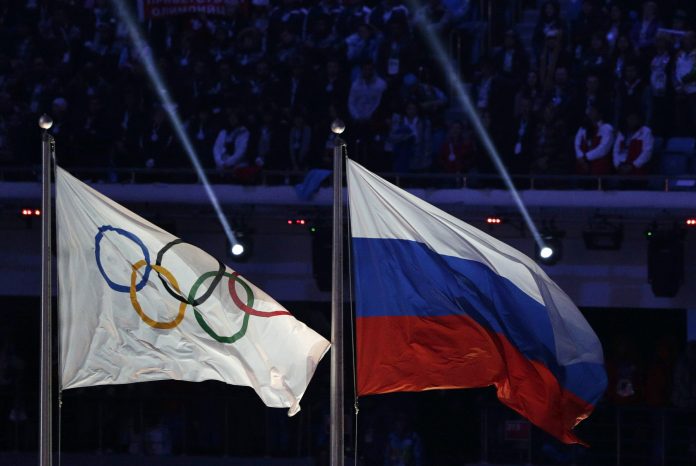
GENEVA (AP) — Russia will not be able to use its name, flag and anthem at the next two Olympics or at any world championships for the next two years after a ruling Thursday by the Court of Arbitration for Sport.
The Lausanne-based court halved the four-year ban proposed last year by the World Anti-Doping Agency in a landmark case that accused Russia of state-ordered tampering of a testing laboratory database in Moscow. The ruling also blocked Russia from bidding to host major sporting events for two years.
Russian athletes and teams will still be allowed to compete at next year’s Tokyo Olympics and the 2022 Winter Games in Beijing, as well as world championships including the 2022 World Cup in Qatar, if they are not implicated in doping or covering up positive tests.
One win for Russia is the proposed team name at major events. The name “Russia” can be retained on uniforms if the words “Neutral Athlete” or equivalents like “Neutral Team” have equal prominence, the court said.
The burden of proof was also shifted away from Russian athletes and more toward WADA when it comes to their doping history being vetted for selection to the Olympics or other sporting events.
Russian athletes and teams can also retain the national flag colors of red, white and blue in their uniforms at major events. That was not possible for Russians at the past two track world championships.
Even with those concessions, the court’s three judges imposed the most severe penalties on Russia since allegations of state-backed doping and cover-ups emerged after the 2014 Sochi Olympics.
WADA president Witold Bańka hailed the court’s decision despite the ban being cut to two years.
“The (CAS) panel has clearly upheld our findings that the Russian authorities brazenly and illegally manipulated the Moscow Laboratory data in an effort to cover up an institutionalized doping scheme,” Bańka said in a statement.
The case centered on accusations that Russian state agencies altered and deleted parts of the database before handing it over to WADA investigators last year. It contained likely evidence to prosecute long-standing doping violations.
The CAS process was formally between WADA and the Russian anti-doping agency, which refused to accept last year’s four-year ban. The Russian agency, known as Rusada, was ruled non-compliant last year — a decision upheld Thursday by the three judges.
Rusada was also ordered to pay $1.27 million to WADA.
The judges’ 186-page ruling is expected to be published in the next few weeks.
The Russian agency can appeal the sanctions to the Swiss supreme court in Lausanne.
When a four-day hearing was held in Lausanne last month, Russian athletes and their lawyers took part as third parties arguing they should not be punished for misconduct by state officials not working in sports.
Giving WADA the lab database by a December 2018 deadline was a key condition for Rusada being reinstated three months earlier when a previous expulsion from the anti-doping community was lifted.
WADA investigators in Moscow eventually got the data one month late. Evidence of doping tests and emails appeared to have been deleted or changed, and whistleblowers were implicated.
The ruling allows Russian government officials, including President Vladimir Putin, to attend major sporting events if invited by the host nation’s head of state.
WADA investigators went to Moscow two years ago to collect the database and begin verifying evidence that would help sports governing bodies prosecute suspected doping violations dating back several years.
Although Russia would be stripped of hosting world championships in the next two years, events can be reprieved. Governing bodies have been advised to find a new host “unless it is legally or practically impossible to do so.”
___
More AP sports: https://apnews.com/apf-sports and https://twitter.com/AP_Sports

